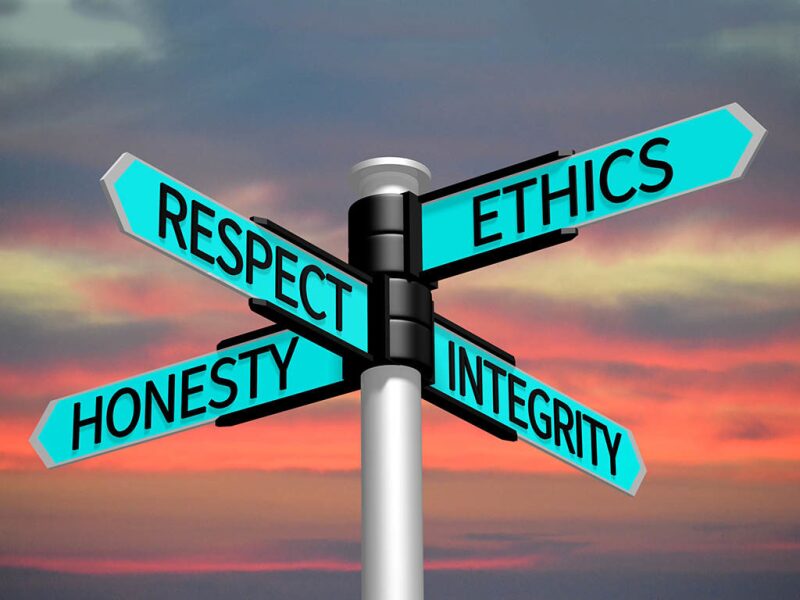Given the nature of the energy business, we are all challenged with performing the job function in an ethical manner when faced with diverse working conditions, impending deadlines, and a large workload. It should not be underestimated that the individual’s behavior contributes directly to the reputation of the company that employs us. The decisions we make in the field or in the office can have wide-ranging implications within the company and could possibly affect the industry as a whole. This issue’s forum explores young professionals’ views on ethical behavior by analyzing the responses submitted to an online questionnaire.—John Donachie, TWA Forum Editor
In this issue, the forum investigates the perceptions and attitudes of the oil and gas industry’s youth on a subject that might be considered controversial—the industry’s attitude toward ethical behavior.
As with previous forum questionnaires, each question is deliberately provocative to stimulate a thoughtful response and promote further discussion. References to companies and individuals have been removed to promote an honest response and protect confidentiality. Where direct quotes are presented, the opinions do not reflect the stance of any particular company or SPE, but display only that individual’s perception on the subject matter.
This issue’s forum is divided into two sections: (1) general perception on energy industry ethics and (2) general questions posed to stimulate thought and comment. Fig. 1 shows the population of those participating in the questionnaire. There has been a great increase in contributions from young members through the use of an online questionnaire facility provided by SPE Market Research.
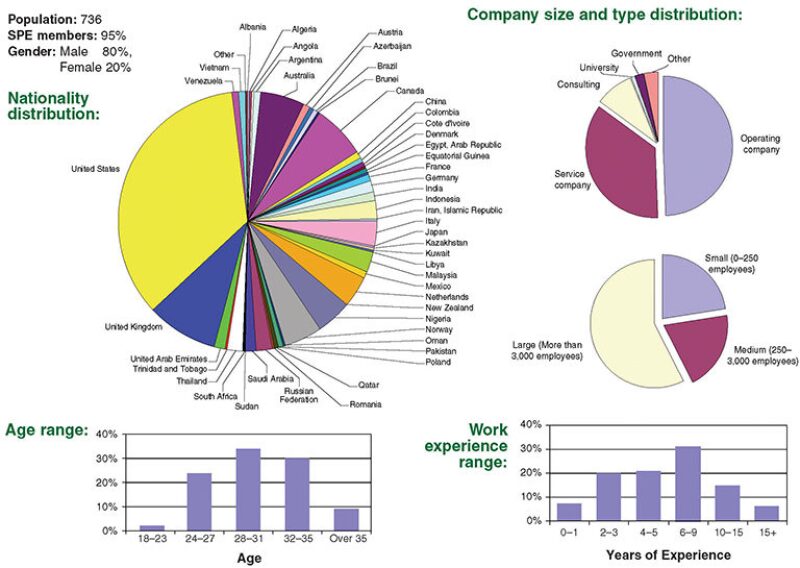
Excerpt from SPE’s “Guide for Professional Conduct”: The Fundamental Principle The engineer as a professional is dedicated to improving competence, service, fairness, and the exercise of well-founded judgment in the ethical practice of engineering for all who use engineering services, with fundamental concern for protecting the environment and safe-guarding the health, safety, and well-being of the public in the pursuit of this practice.
Section 1: General Perception of Energy Industry Ethics
Each company has a code of conduct for professional behavior for employees. Performing business in accordance with these policies is usually mandatory. In this section, we explore young professionals’ general awareness of corporate policies on ethical behavior, how these policies affect them, and their perceptions of the ethical behavior of the industry. Analysis shows that there is general overall understanding of ethical behavior policy and how such policies affect individuals. Also, responses indicate that, largely, there is confidence that the industry operates in an ethical manner.
Question 1: Are you aware of your company’s corporate responsibility procedures?
Almost two-thirds of all survey respondents are aware of their company’s corporate responsibility procedures, and another 32% are partially aware (Fig. 2). Only 7% are not aware of these procedures. By gender, males claimed to be more aware than females, while a greater percentage of females were partially aware. By age group, aside from the youngest age group (18–23) being the most aware of corporate responsibility procedures, the level of awareness increased with age. By job class, virtually all Officers/Directors were aware of the procedures, and 79% of the Managers/Supervisors/Foremen were, while only 58% of the staff engineers/scientists said that they were fully aware. This could be an indication that while the awareness is high in the top job classes because of the possible implications associated with noncompliance, communication/training about these procedures to the other job classes may simply be lower. By work experience, except for those with 0–1 year experience, awareness of the procedures increases with years of experience. By nationality, those respondents from North and South America are more aware of these procedures than the rest of the world.
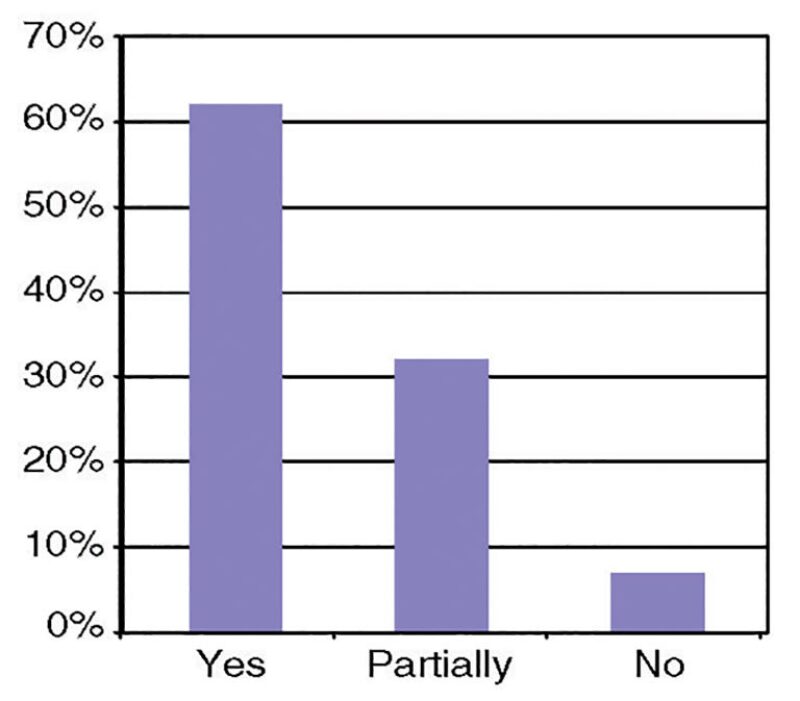
Question 2: Do you believe that the oil and gas industry upholds ethical practices in general?
Only 7% of all survey respondents believe that the oil and gas industry always upholds ethical practices in general, while 76% believe that it mostly does (Fig. 3). Sixteen percent believe that it mostly does not. By gender, there is little difference between male and female opinions on this issue; however, by age group, the percentage of those who believe that the industry always or mostly upholds ethical practices declines slightly as age increases. By job class, while a high percentage of officers/directors believe that they always or mostly uphold ethical practices, 16–17% of managers/supervisors/foremen, consultants, and staff engineers/scientists believe that it mostly does not. By work experience, an average of 21% of the respondents with between 2 and 9 years’ experience believe that the industry mostly does not uphold ethical practices in general. By nationality, while the regions with the most favorable opinion about the oil and gas industry’s ethical practices were the Middle East, Far East, Asia Pacific, and Australia, the nationalities with the least favorable opinion were Europe, Russia, and Africa.
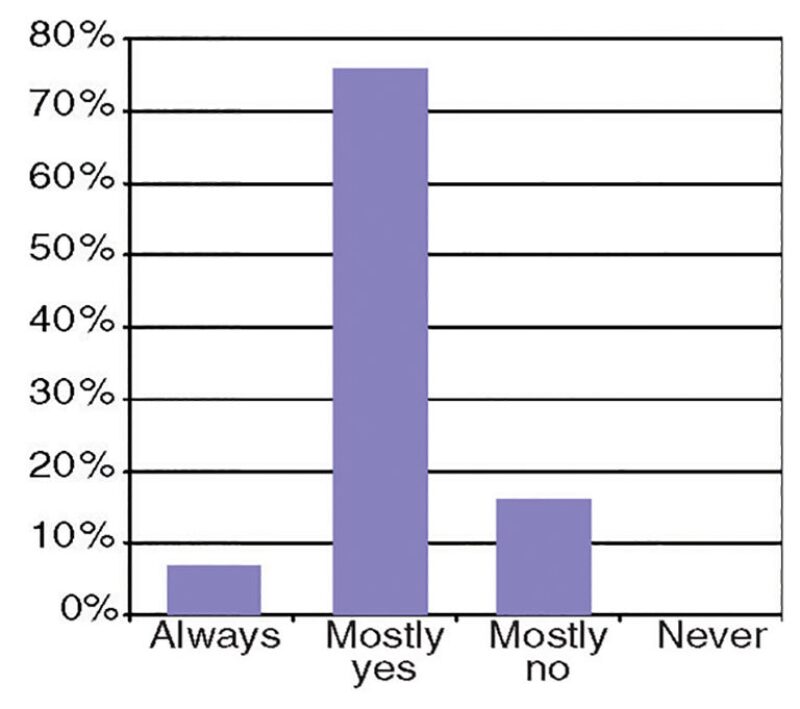
Question 3: Do you understand the consequences of unethical corporate behavior?
While 97% of the respondents either completely or partially understand the consequences of unethical corporate behavior for their company, 98% understand the consequences for themselves (Fig. 4). By gender, males believe that they have a greater understanding of the consequences than females, and by age and work experience, not surprisingly, the level of understanding increases with age and work experience. By job class, the higher (officer/director/manager) job classes have the greatest understanding of the consequences of unethical corporate behavior. By nationality, those in North and South America appear to have the greatest understanding of the consequences.
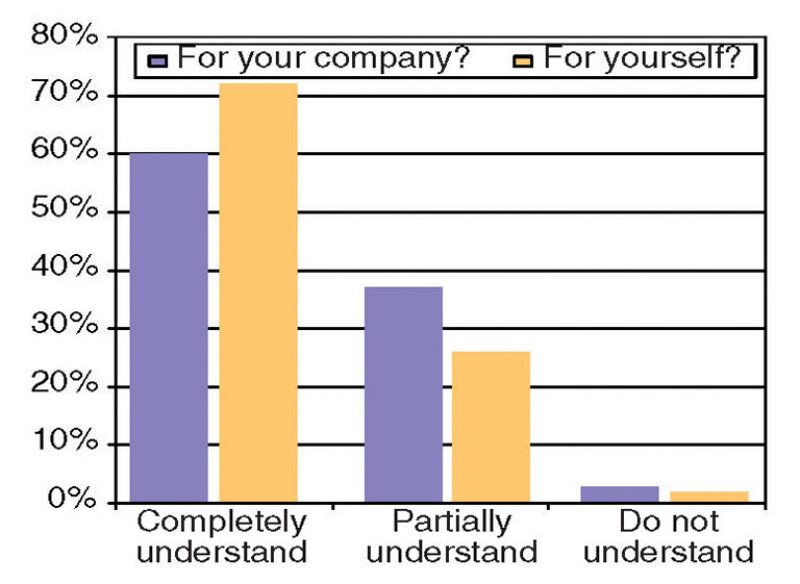
Question 4: Do you see any divergence between what the company’s procedure on ethical behavior is and what it ultimately does?
More than one-third (36%) of the respondents believe that there is a divergence between what the company’s procedure on ethical behavior is and what it ultimately does (Fig. 5). This belief is consistent across gender, age, work experience, and job class, except for company officers/directors, where only 15% believe that there is a divergence. With regard to nationality, the divergence is perceived to be the greatest in Europe, Russia, and Africa.
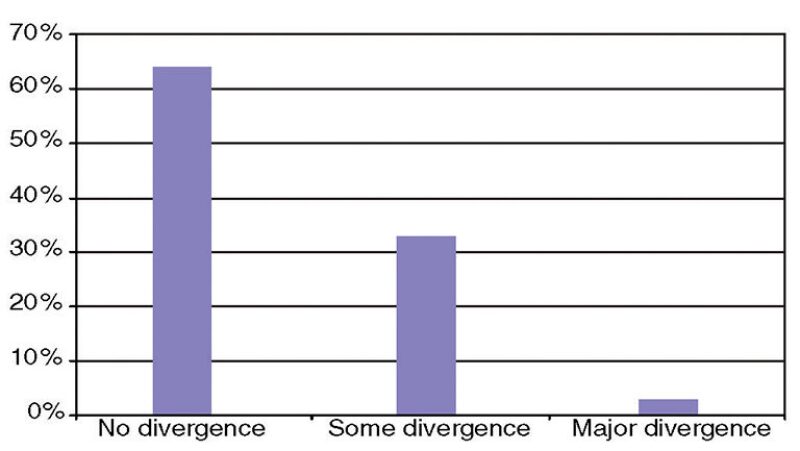
Representative comments regarding this divergence are as follows:
- Sometimes procedures are not followed, mainly because they are not “economically” profitable.
- What upper management states as policy does not seem to affect how the grass roots of the organization operates.
- Because I work for a small privately held company, I sometimes see that what is supposed to be the case and what actually is the case are different (often for financial reasons).
- If the competition does it, you may have to in order to stay competitive, especially if the clients remain impartial to the breach in ethics.
- It is at times extorted in third-world countries and first-world countries by means of extraordinary facilitation or expediting payments. To the extent this is required and not a blatant bribe by individuals, some of this goes on as a requirement for doing business.
- Corporate ethical behavior is loaded with management polish that is hard to sustain in some areas of the world. These policies are based on “western” (U.S., Europe, some others) standards, which are seen as “good and accepted industry practice.” However, there are also some areas where they have slightly different, or totally different, business etiquettes. To operate in these areas is more a decision of “do we want to do business here” than to maintain the standards.
Question 5: Are you encouraged by your company to perform your duties in an ethical manner?
Overall, 64% of the respondents said that they are always encouraged by their company to perform duties in an ethical manner, while another 31% said that they are mostly encouraged (Fig. 6). Only 5% indicated that they are not encouraged. The differences are not significant by gender or age group. However, as the level of work experience increases, level of encouragement seems to increase, perhaps in proportion to their level of responsibility. With regard to job class, there is clearly a gap between the opinions of officers/directors and the other job classes, who feel less encouraged to perform their duties in an ethical manner than the officers/directors.
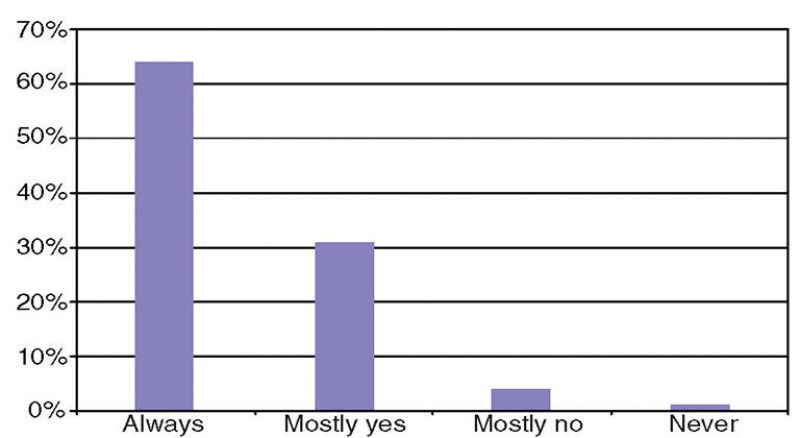
Representative comments are as follows:
- Like most oil and gas companies, we operate in environmentally sensitive areas that are very visible to public scrutiny. As everything we do is observed, it is in the best interest not to “cut corners,” as it can and will impact very heavily upon the corporate image and ultimately the bottom line.
- Statements and verbal indications are all there, but commitment is what is lacking.
- Always encouraged, but some managers refused to comply with certain aspects if it lowers profitability.
- Ethics is subject to what is best for the company.
- It is one thing for the president to demand ethical behavior, but when you see other experienced employees performing their duties in an ethical manner, that reassures me that it is the right thing to do.
Section 2: Opinions on Specific Situations
This section of the questionnaire asked some questions to gauge the opinions of young professionals on the course of action they would take in a given situation.
Question 6: When is it okay to pay government officials to facilitate business?
Overall, 65% of the respondents said that government officials should never receive payment to facilitate business, while 22% said that it depends on the country of operation (Fig. 7). It is okay if that is the culture in that location. The remaining 13% said that it depends on the circumstances. The percentages were not significantly different by gender. By age group, the older the respondent, the more likely the opinion that government officials should never receive payment to facilitate business; and the younger the respondent, the stronger the opinion that it depends on the country of operation and their culture. By job class, the differences were not significantly different. Even among the officers/directors, only 67% felt that government officials should never receive payments to facilitate business. By work experience, the greater the experience, the less likely the respondent was to support payment to facilitate business.
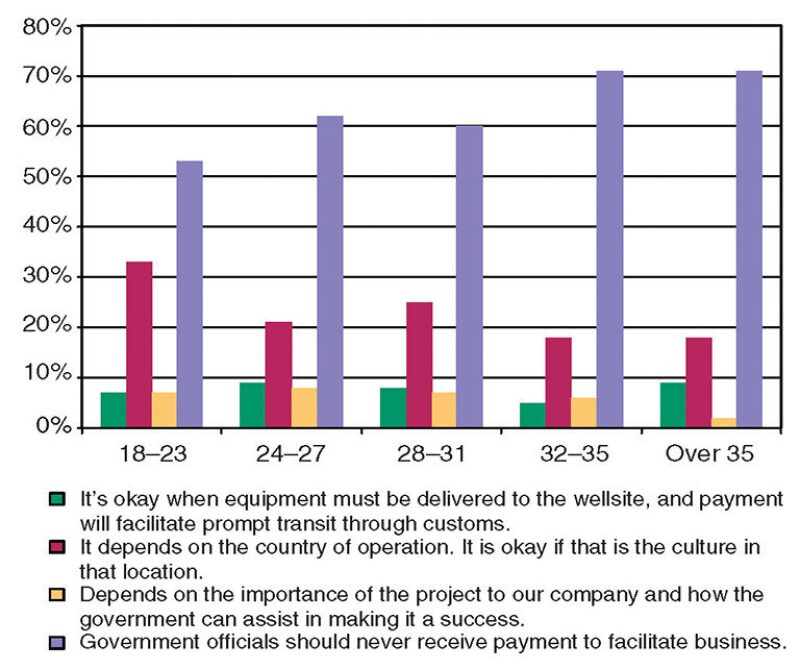
Question 7: You work in a country where many people drive without licenses. One day, over lunch, one of your colleagues brags about driving the company 4-wheel-drive vehicle even though he does not have a license, clearly against company policy. What would you do?
Taking the correct course of action is not necessarily the easy option. In business practice, there are some aspects that are mandatory and others that are discretionary. Safety is mandatory under any circumstance, and compromise is unacceptable in this area. In the situation described above, you have been given responsibility for action, and although acting ethically may prove difficult, you must ensure that your colleagues are behaving in a manner that protects their, and your, safety.
Representative responses are as follows (Fig. 8):
- Tell him not to do it again.
- Report to the appropriate health, safety, and environment manager or line manager in the company.
- Provided no harm was done, warn him; next time you will report him. Any harm—obligated to report to senior staff.
- Tell my colleague that it was the wrong thing to do. Express disapproval. Probably wouldn’t report it.
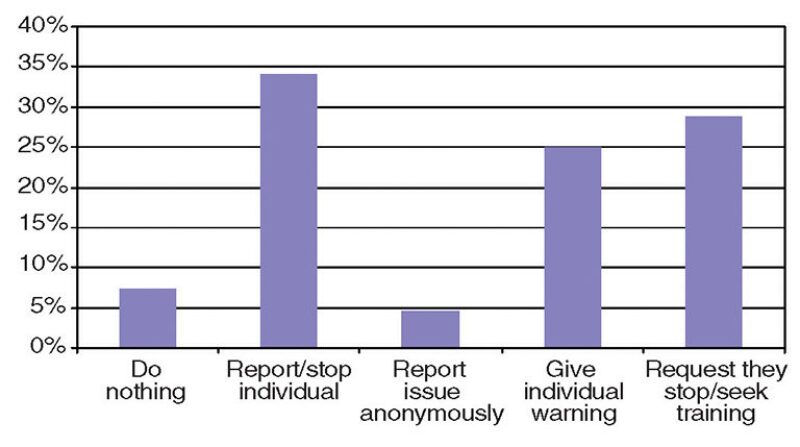
Question 8: As a manager of a business unit, you must choose one contractor for an environmentally critical phase of a project. What logic would you use for the contractor selection?
A total of 59% of the respondents said that they would select the contractor on the basis of performance against comparative analysis on cost, technical excellence, and safety (Fig. 9). Another 35% said that they would select the best technical proposal aimed at minimizing environmental risks. Both are considered good answers. By gender, males slightly favored the former answer, while females slightly favored the latter answer. By age group and work experience, the inclination to select the first answer increased with age and experience. It was also the most favored answer by Officers/Directors and Managers/Supervisors/Foremen.
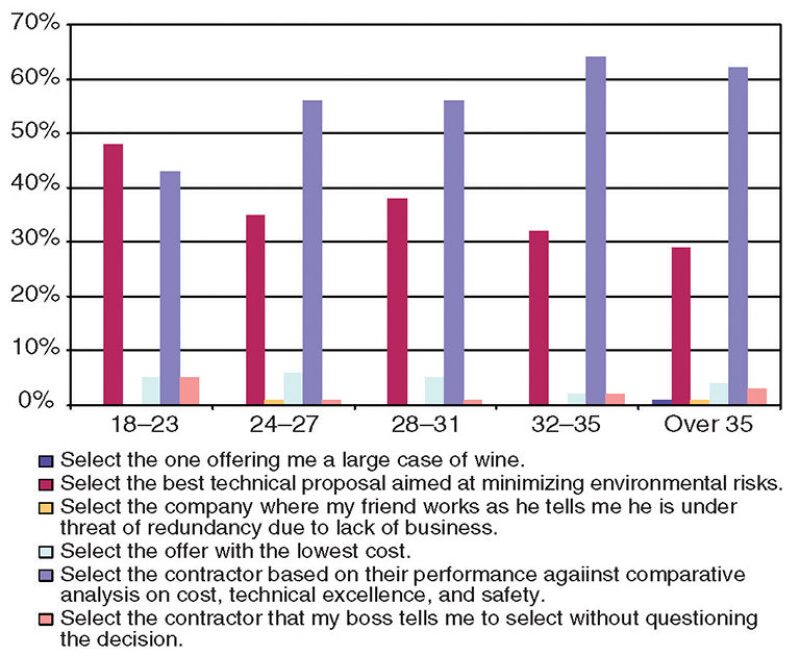
Question 9: You bump into an old friend from university who works for one of the companies bidding for a contract handled by your department. He invites you to dinner and entertainment at a fancy and expensive restaurant. He mentions that this is on a purely personal basis; the costs won’t be reported to his company or charged to his company’s account. What would you do?
This question was posed to highlight that clashes can occur between personal and professional circumstances, resulting in ethical dilemmas. If a situation raises the question that your actions may be perceived by others to be unethical, you should remove the possibility that you risk acting unethically and ask others for advice. The stakes in behaving ethically are very high—breaches in ethical behavior are displayed on international news networks. Check before you act, and err on the side of caution.
Representative answers are as follows (Fig. 10):
- If they were telling me the truth, there would not be any problem. I would go with them because I separate personal activities from work-related ones. If there were a lie, my old friend would not be my friend any more.
- I will decline the invitation.
- Decline until the bidding process (or tender process) is complete.
- I would go out to dinner.
- Go to the dinner, but pay for your own meal or half of the total meal expenses.
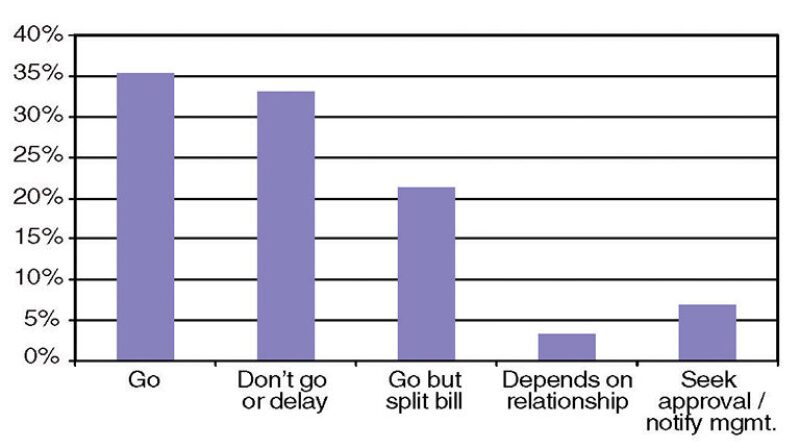
Question 10: The Human Resources Dept. asks you, as Head of the Reservoir-Petroleum Dept., to complete the performance evaluation of your team. You have also been told to select one individual for promotion. How/who do you choose?
This question offered a variety of answers, with one answer giving the “by the book” correct response. Most people correctly answered the question. However, comments reflected that working conditions, company politics, personal opinions, and relationships ultimately played a role in the final decision.
Overall, 95% of respondents said that they would select the candidate on the basis of technical and professional performance and their impressions of the candidate’s potential. This answer was consistent across gender, age groups, job classes, work experience, and nationality.
Representative comments are as follows:
- Performance driven is the key, regardless of his age, sex, or race. A hard-working person is always my pick.
- You always want to choose someone that shows leadership potential and someone that you would ultimately want to work for.
- Only criteria for promotion should be merit, ethical maturity, and appreciation of human values.
- This is in general a difficult decision, even though I would like to think my personal feeling wouldn’t affect this. I’m not sure what would have happened in real life.
- It’s not black and white, and really all factors would affect my decision.

